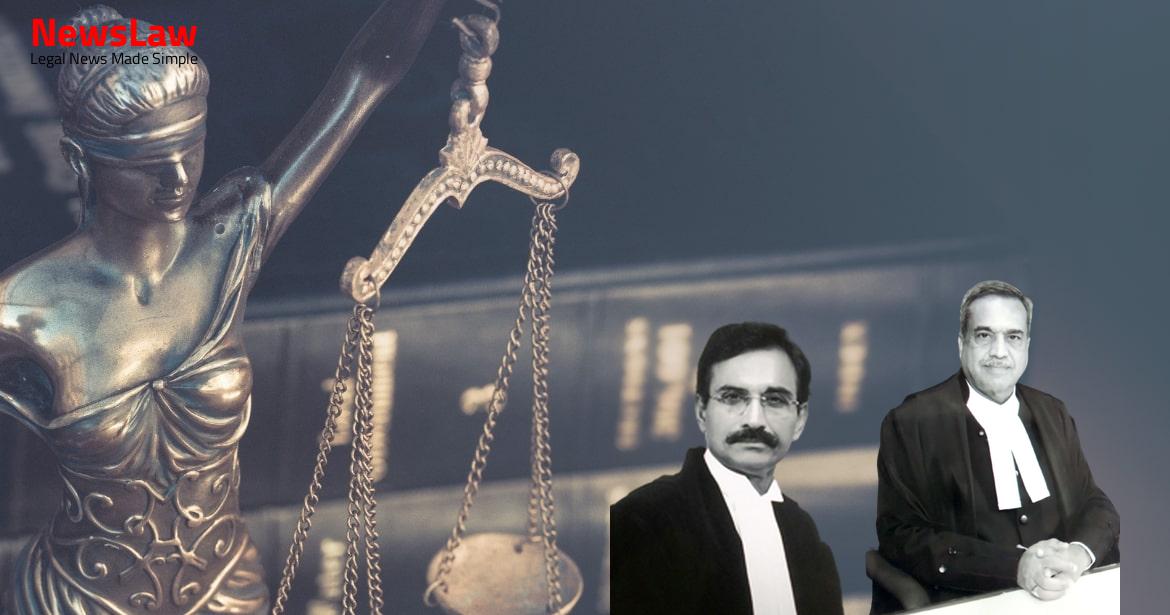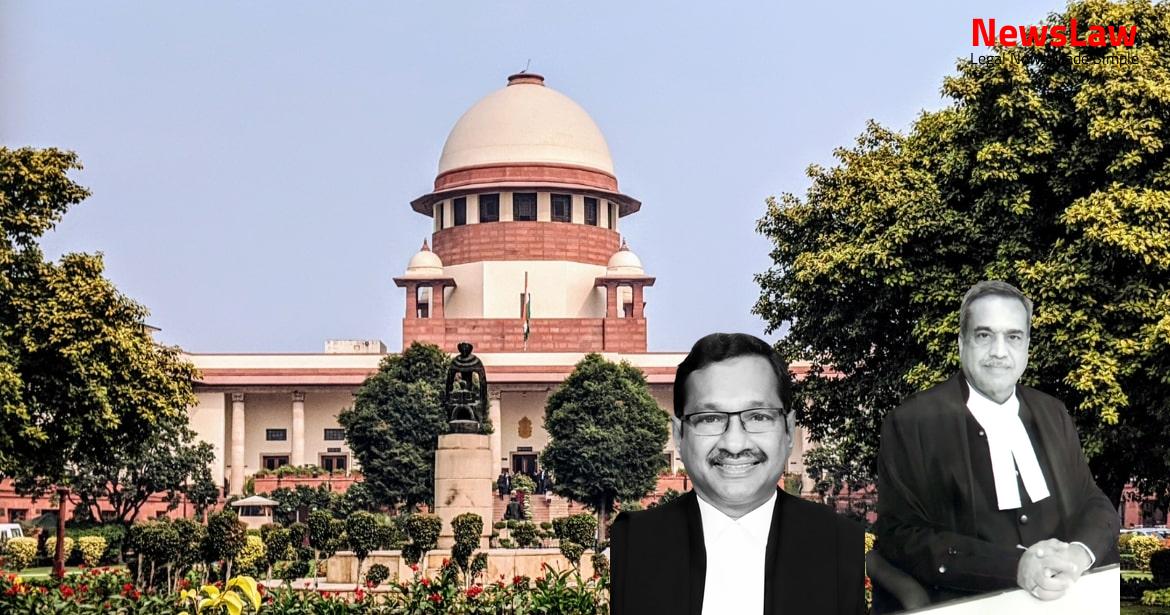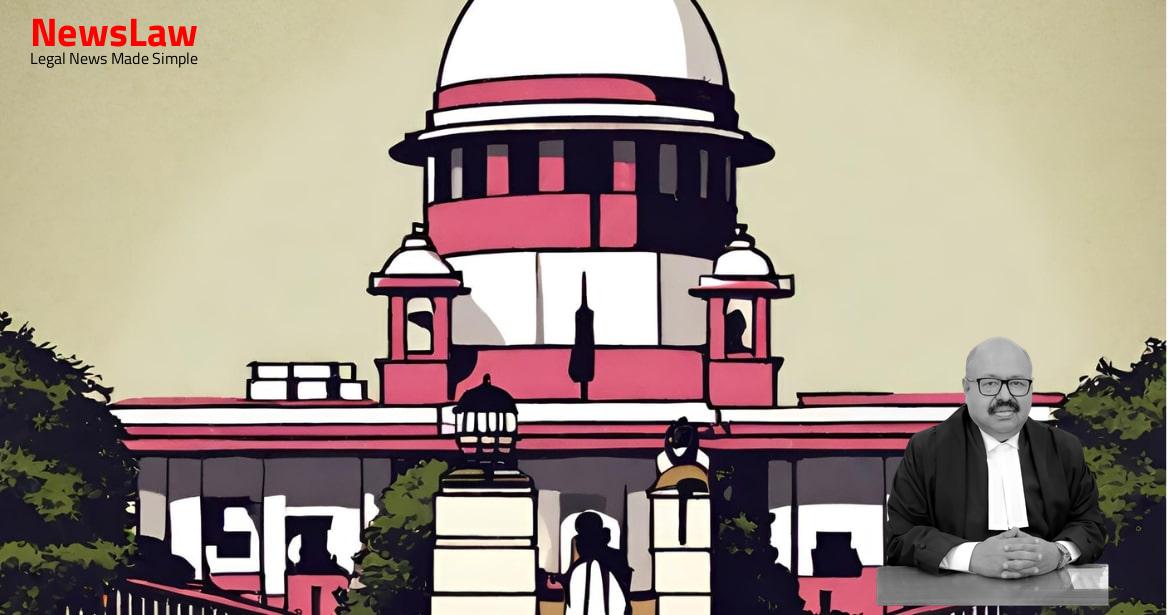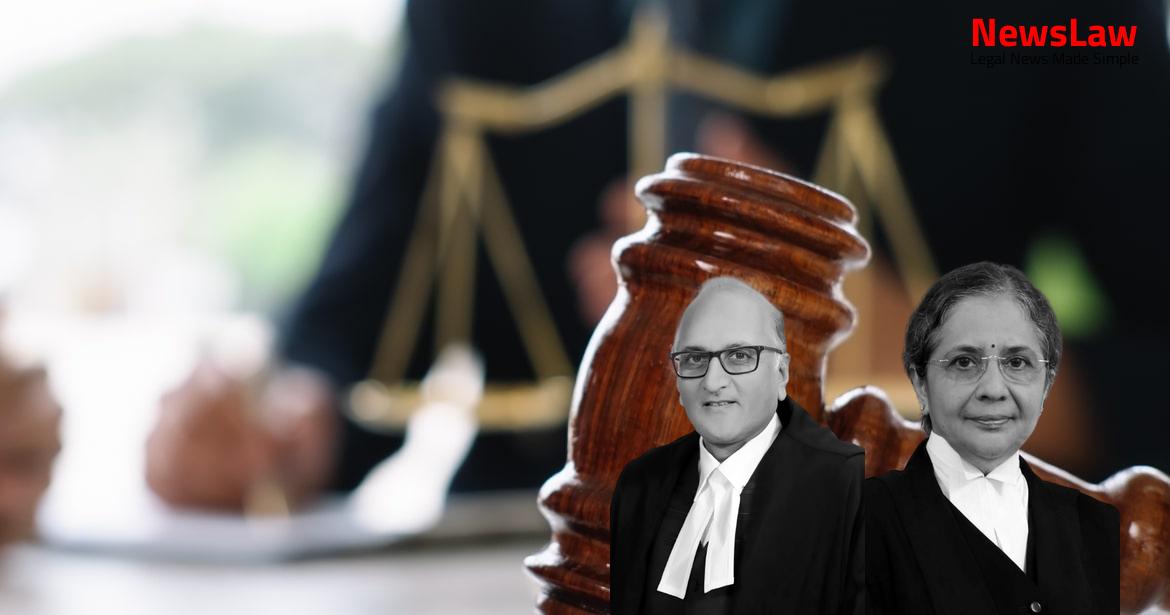In a significant legal development, the Supreme Court has issued a verdict overturning the decision of the High Court in the case concerning benami transactions. The case involved a dispute over property ownership and the alleged benami nature of transactions. Stay informed about this crucial legal precedent set by the Supreme Court.
Facts
- The High Court dismissed the appeal and confirmed the Judgment and Decree of the Trial Court.
- The original defendant nos. 1 to 3 were the appellants in this case.
- The suit for partition was decreed in favor of the original plaintiff.
- The impugned Judgment and Order were passed by the High Court of Judicature at Madras on 05.01.2016.
- Original plaintiffs filed suit for partition of the suit properties and separate possession.
- First defendant claimed that the first item of the suit property was purchased with her own money.
- Plaintiffs claimed that first defendant’s husband sold ancestral properties to purchase suit property in her name.
- First defendant revoked a Will she had made in favor of plaintiffs due to lack of care.
- Trial court found plaintiffs entitled to 3/4 share in suit properties.
- Defendants claimed properties were self-acquired by first defendant, except for items 1 and 3.
- First defendant’s daughter executed a Release Deed for her share in the properties.
- Defendants argued that first defendant constructed a house on the property purchased and is in possession.
- First defendant denied acting as a manager of any joint family.
Also Read: Address Update Requirement: Legal Implications for Corporate Entities
Issue
- The Trial Court framed multiple issues related to the ancestral properties of Elumalai and the deceased Narayansamy.
- One of the key issues was whether the 1 defendant had managed the suit schedule properties as the Family Manager.
- The existence and impact of a Release Deed dated 24.04.90 executed by Nagabooshanam Ammal were also questioned in relation to the plaintiffs’ claim for partition.
- The matter of a Will purportedly executed by the 1 defendant in favour of the plaintiffs, and its subsequent revocation, added complexity to the case.
- The plaintiffs’ joint possession and entitlement to a 3/4 share over the properties were significant points of contention.
- The joint enjoyment of the suit schedule properties by the family members as Joint Family Property was debated as well.
- An issue regarding the proper valuation of the present suit was raised, indicating possible discrepancies in the valuation process.
- Ultimately, the main question revolved around the relief that the plaintiffs were entitled to receive as a result of the litigation.
Also Read: Army Discharge Case: Upholding Justice for Long Service Rendered
Arguments
- The Trial Court and High Court erroneously shifted the burden onto the defendants to prove that the transactions/Sale Deeds in favor of defendant no.1 were not benami transactions.
- The appellants argue that the plaintiffs failed to provide cogent evidence to prove that the transactions were benami.
- The release deed executed by Nagabhushanam in favor of defendant no.1 does not necessarily indicate joint family properties of Narayanasamy Mudaliar.
- The appellants contend that the suit properties were purchased by defendant no.1 using stridhana received from her parents and by selling gold jewelry.
- There were no specific pleadings in the plaint that the sale transactions of the suit properties in favor of defendant no.1 were benami transactions.
- The plaintiffs failed to discharge the onus of proving that the transactions were benami.
- The courts erred by considering the suit properties as ancestral or purchased from funds raised by selling ancestral properties solely based on two documents without sufficient evidence.
- There is disagreement on the interpretation of the release deed at Exh. A1.
- The appellants argue that the properties were not purchased by Narayanasamy Mudaliar and that the findings are erroneous.
- The ancestral properties were generating income, and were used to purchase properties in the name of Defendant No.1 (Original Defendant No.1) during the lifetime of Narayanasamy Mudaliar.
- The properties were also acquired by selling some of the ancestral properties.
- The burden of proof was wrongly placed on the defendants to prove that the sale transactions were not benami.
Also Read: Justice Served: Supreme Court Ruling on CBI Inquiry against Army Officer
Analysis
- The Trial Court and High Court erred in holding the properties as benami without specific issue framing on the matter.
- Merely contributing part of the sale consideration does not prove benami transaction for the joint family.
- Stamp duty payment by Narayanasamy Mudaliar does not solely indicate a benami transaction with defendant no.1.
- Plaintiffs failed to prove through evidence that Narayanasamy intended to purchase properties in defendant no.1’s name.
- Sale deeds were not proven to be from funds of ancestral properties sold by Narayanasamy.
- The Release Deed executed by Nagabushanam in favor of defendant no.1 with payment of Rs.10,000 does not prove joint family property.
- Benami Transaction Act and presumption regarding wife and children’s transactions were discussed, with omission of Section 3(2) affecting the case.
- Defendant no.1’s Will and revocation indicated self-acquired property sources, not joint family assets.
- Legal evidence of definite character required to prove benami transactions, mere conjectures not valid proof.
- Original pleading by plaintiffs did not specifically claim the transactions were benami with defendant no.1.
- The burden of proving that a particular sale is benami and the apparent purchaser is not the real owner rests on the person asserting it to be so.
- Legal evidence of a definite character must be adduced to prove the fact of benami or establish circumstances raising an inference of that fact.
- The intention of the parties is key in determining a benami transaction.
- Six circumstances can be considered as a guide to determine if a transaction is benami:
- 1. The source of the purchase money.
- 2. The nature and possession of the property after the purchase.
- 3. The motive for giving the transaction a benami color.
- 4. The position and relationship between the claimant and the alleged benamidar.
- 5. The custody of title deeds after the sale.
- 6. The conduct of the parties dealing with the property after the sale.
- The burden of showing a transfer is a benami transaction lies on the person asserting it, and the true character is determined by the contributor’s intention.
- Surrounding circumstances, relationship, motives, and subsequent conduct help determine the intention behind a transaction.
- The person shown as the purchaser in the deed has a presumption in their favor unless evidence suggests otherwise.
- No absolute formulae exist for determining if a sale is benami, but certain circumstances are usually considered.
- Binapani Paul case also discussed the nature of benami transactions.
- Sale Deeds in favor of Defendant No. 1 were not benami transactions.
- Suit properties, except property nos. 1 and 3, were self-acquired properties of Defendant No. 1.
- Plaintiffs have no share in the suit properties except property nos. 1 and 3.
- Property nos. 1 and 3 were admitted to be ancestral properties by the Counsel for Defendant No. 1.
Decision
- The High Court and Trial Court’s decision that the plaintiffs have a 3/4 share in the suit properties (excluding Item Nos. 1 and 3) is overturned and set aside.
- The present appeal is partially allowed in this regard.
- No costs are awarded in this matter.
- The Trial Court is directed to modify the Preliminary Decree accordingly.
Case Title: MANGATHAI AMMAL (DIED) THROUGH LRS Vs. RAJESWARI .
Case Number: C.A. No.-004805-004805 / 2019



